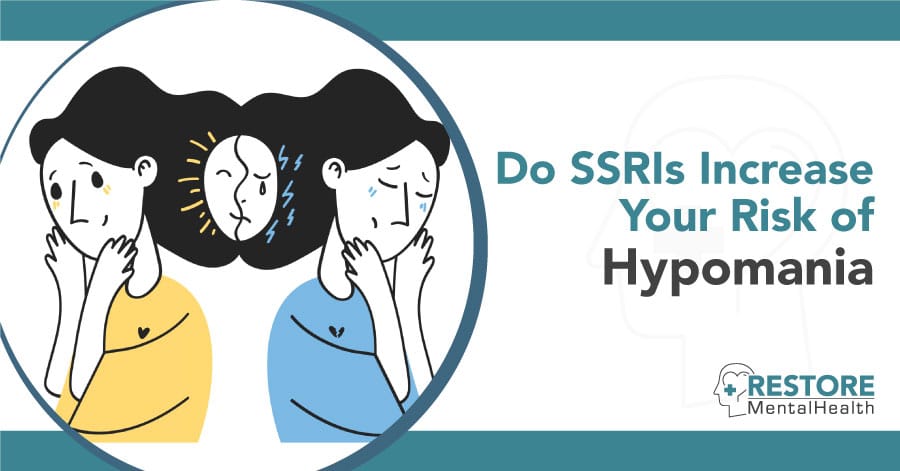You’re here because you’re wondering if antidepressants can cause bipolar episodes. Well, the answer can be a little complicated. Let’s look at the link between SSRIs, one of the most common types of antidepressants, and the risk of a hypomania episode.
Individuals who have bipolar are prone to depressive, manic and hypomanic episodes. When you’re going through a hypomania episode, you typically don’t recognize what’s happening until later (if at all). You just feel like you have a lot of energy, are in a great mood and can get anything done. Hypomania is a less severe version of mania, but it can still come with risks. You may make impulsive decisions that can severely impact you or others — like leasing a new car you can’t afford, getting a new tattoo you won’t like later on or quitting your job over a minor infraction. Often, your closest loved ones and friends can pick up when you’re in an episode of hypomania, but you can’t.
Ideally, the proper medication should help you control your moods so the frequency of hypomania episodes goes down or disappears entirely. However, if you’ve just started taking antidepressants, you may have noticed or may be worried about an increase in hypomania incidents. Luckily, if this is happening to you, some solutions are available.
What Is a SSRI?
Selective serotonin reuptake inhibitors (SSRIs) are a common type of antidepressant medication. SSRIs help with the reabsorption of serotonin by neurons, which increases the availability of serotonin in the body and can make a person feel happier and more balanced.
What Are the Effects of SSRIs on Mood?
The effect of SSRIs on a person’s mood is hugely varied from person to person. The medication is meant to increase serotonin levels in the brain, improving sleep, mood and emotion. However, medication rarely works the same for all people. Some of the known side effects of SSRIs are:
- Headache
- Drowsiness
- Insomnia
- Nervousness and restlessness
- Reduced sexual drive
- Appetite changes
In many cases, side effects from SSRIs naturally subside after a week or two. If they last past two weeks, it’s recommended you speak with your doctor. The solution may simply be testing out a different brand and potency of SSRIs to find the correct dosage for your body.
Can Antidepressants Cause Bipolar Mania Episodes?
It’s estimated that 2.3 million Americans have been diagnosed with bipolar disorder, but the actual number is significantly higher as many individuals are left undiagnosed. Bipolar disorder is a chronic mental disorder that results in significant shifts in mood, energy and concentration. If left untreated, individuals with bipolar disorder experience episodes of extreme highs (known as hypomania and mania) or extreme lows (severe depression). These episodes can last from hours to days or months.
Luckily, bipolar disorder can be treated. Individuals require a lifelong combination of therapy and prescription medication to reduce and potentially eliminate mood swings. Bipolar disorder is most commonly treated with mood stabilizers, but some patients are also prescribed antidepressants.
A question many people have is, “Can antidepressants cause mania?” It’s known that antidepressants can cause episodes of mania in bipolar patients. This is most commonly seen when bipolar patients are given antidepressants without mood stabilizers. Often, patients with bipolar disorder are misdiagnosed as being depressed and therefore put on antidepressants. The antidepressant medication can increase manic episodes and worsen the condition.
Recent research has found a link between antidepressants and the risk of suicide. One potential explanation for this is the high number of bipolar patients who are being misdiagnosed, given only antidepressants and then seeing their condition deteriorate.
Bipolar patients should always be given mood stabilizers as the primary prescription drug for treatment. If the mood stabilizer doesn’t seem to improve the patient’s depression, then antidepressants may be prescribed.
The antidepressants most likely to cause mania are “those with dual-action serotonergic-noradrenergic activity, such as tricyclics and venlafaxine.” On the other hand, serotonergic agents seem to be much safer and don’t impose as high of a risk of triggering mania.
SSRIs and Hypomania
As we’ve mentioned, SSRIs are the most commonly prescribed antidepressant. SSRIs may trigger hypomania episodes in bipolar patients in two situations. First, when a person initially adjusts to the new medication, they may be at an increased risk of hypomania. If the SSRIs work well and quickly, the sudden increase in serotonin in the body may cause feelings of elevation and happiness that translate into a hypomania episode.
The other time a bipolar patient may be at an increased risk for hypomania is when they withdraw from SSRIs. If a patient has been taking SSRIs for a while and abruptly goes off them, the sudden brain chemistry change can be a shock to the system and trigger a hypomania episode.
The good news is that a hypomania episode isn’t quite as bad as a manic episode. Additionally, once your body adapts — either to the introduction or withdrawal of SSRIs — the risk of hypomania should reduce.
Getting the Right Medication
Ultimately, it takes time for people to find the right medication. You and your doctor will have to experiment until you find the proper dosage, brands and combination of prescription drugs that work best to treat your bipolar disorder.
If your mood feels unregulated and gets worse or unmanageable, speak to your prescribing physician to find a better solution.
Bipolar Disorder Is Treatable — Get Help Today at FHE Health
Bipolar disorder can overtake your life if left untreated, but it doesn’t have to. The friendly, experienced professionals at Restore can help you find the right solution that works for you. Our facility has helped thousands of people get the treatment they need to live happy, fulfilled lives. If you’re curious about finding out more about our programs, call us today for more information at (877) 594-3566.



